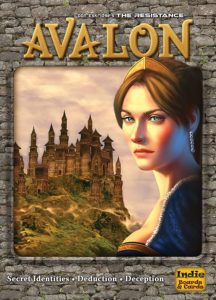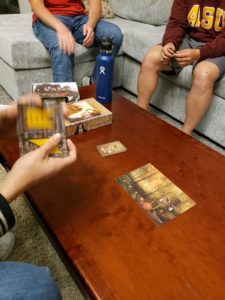 For my first critical play, I tried out Avalon, a social deduction card game designed by Don Eskridge in 2012. A variant of The Resistance, Avalon centers around a battle between the forces of good and evil set in the fantasy world of King Arthur. Avalon is marketed as a game for players 13 years and older, however I personally believe that the target audience would be around 15 years and older, especially for those interested in fantasy themes (given that Avalon’s main distinction from its predecessor is its fantasy setting).
For my first critical play, I tried out Avalon, a social deduction card game designed by Don Eskridge in 2012. A variant of The Resistance, Avalon centers around a battle between the forces of good and evil set in the fantasy world of King Arthur. Avalon is marketed as a game for players 13 years and older, however I personally believe that the target audience would be around 15 years and older, especially for those interested in fantasy themes (given that Avalon’s main distinction from its predecessor is its fantasy setting).
As a social deception game, Avalon can be played with anywhere from 5 to 10 players, however it seems to be best enjoyed with a group size of around 7 to 8 players. Depending on the number of players, the game can take on differing levels of complexity, utilizing more or fewer special role cards.
Avalon starts with each player receiving a role card which is either fundamentally good (servants of Arthur) or evil (servants of Mordred). A minority of cards grant players special abilities, such as Merlin (knows who is a servant of Mordred) and Percival (knows of two characters who are both either Merlin or Morgana) for the good team, and Mordred (is not revealed to Merlin as evil), Morgana (deceives Percival by also claiming to be Merlin), Oberon (does not reveal themselves to other evil players and other evil players do not reveal themselves to them), and Assassin (chooses who to kill at the end of the game – more on this later) for the evil team. Once learning of their identities, one player leads the group in revealing their identities like so: all evil players reveal themselves to each other (except Oberon), all evil players (except Mordred) are revealed to Merlin, and Merlin and Morgana are revealed (without distinction between roles) to Percival.
The game itself is structured around a series of quests that players undertake, where each team wants to claim each quest. A total of five potential quests, and as such 5+ potential rounds, exist for which a team must be selected for each (the selector of the team rotates each round). Each round has a specified number of people required, and there are no limits as to who can be picked for a team. Once a team is proposed, all players simultaneously vote on whether the team is allowed on the quest – a majority of positive votes is required for the team to go on the quest. The selected team members then each get to secretly vote on whether the mission succeeds or fails – the good team wants all missions to succeed (and must put down a “succeed” card), whereas the evil team ultimately wants the missions to fail (they can choose to either play a “succeed” or “fail” card). Except for the fourth round (where two “fails” are required if there are 7+ players), if any mission receives at least one “fail” card, then the evil team claims that quest, otherwise it is counted for the good team. Victory for either team is found by claiming three quests, however the evil team has a final ability even after the good team has won three quests. The assassin role, along with the other evil players, can decide to kill one player after three quests have gone to the good team. If the evil team correctly identifies and kills Merlin, the evil team wins despite losing the majority of quests. Because of these social dynamics and varying amounts of information that players have exposure to, the game lends itself well to multiple levels of deception, which is especially apparent when playing with people of varying skill levels.
Compared to other social deception games, Avalon has a few bonuses that, in my opinion, make it more enjoyable to play. Compared to its origin Resistance, Avalon has slightly more complicated player dynamics, as well as a fantasy theme that could draw more players from various backgrounds. When compared to other social deduction games such as Coup, Avalon feels perhaps more accessible, as there is no role-switching involved and players cannot be taken out of the game (i.e. there are no individual punishments for lower skill level). Additionally, the social aspect of Avalon is much stronger than Coup, as Coup deals with bluffing more than the deduction and manipulation that is central to Avalon. That being said, for people who enjoy working with more resources/working against the game as opposed to only working against one-another, Coup may be more appealing for its voting systems and dynamic role swaps.
I personally really enjoyed playing Avalon, especially because I don’t tend to play many social deduction games in general. Unfortunately I received a standard good team card, so I was unable to play with any special abilities, however it was still very fun trying to navigate rounds with the information (or maybe misinformation?) from my fellow players. I especially liked how the game mechanics are simple enough to get invested quickly, while still creating a structure for lots of conflict and suspense. I feel like a game’s quality is often measured in the extremes of emotion that it produces, and there were definitely a lot of extremes in the game that we played. In particular, the good team had an amazing win at the end, where early on in the game, one player claimed to be Percival and identified Morgana. As the game progressed, it became clear that the player who claimed to be Percival and another player were both either Percival or Merlin, however they were able to successfully hide their roles until the end, when the Assassin chose to kill Percival instead of Merlin. Earlier, when Merlin claimed to be Percival, the real Percival (also a first-time player) decided to not disclose themselves, and thus created a persona of Merlin that successfully faked out the evil team!
If I had to change a part of the game, I think it could be interesting to include one more specialty role on the good team, as there is currently a significant imbalance of specialty roles. One interesting option could be some sort of twist on the Oberon role, in which one good player is shown as evil to Merlin, and thus creates some amount of guesswork that Merlin has to balance throughout the game. In terms of other changes, it could be interesting to introduce some form of a formal time constraint, which could make discussions in between each round more chaotic and interesting. That being said, I think that one of the strengths of Avalon is that it lends itself to very in-depth conversations, and introducing a time limit could potentially detract from the quality/silliness of said discussions.



